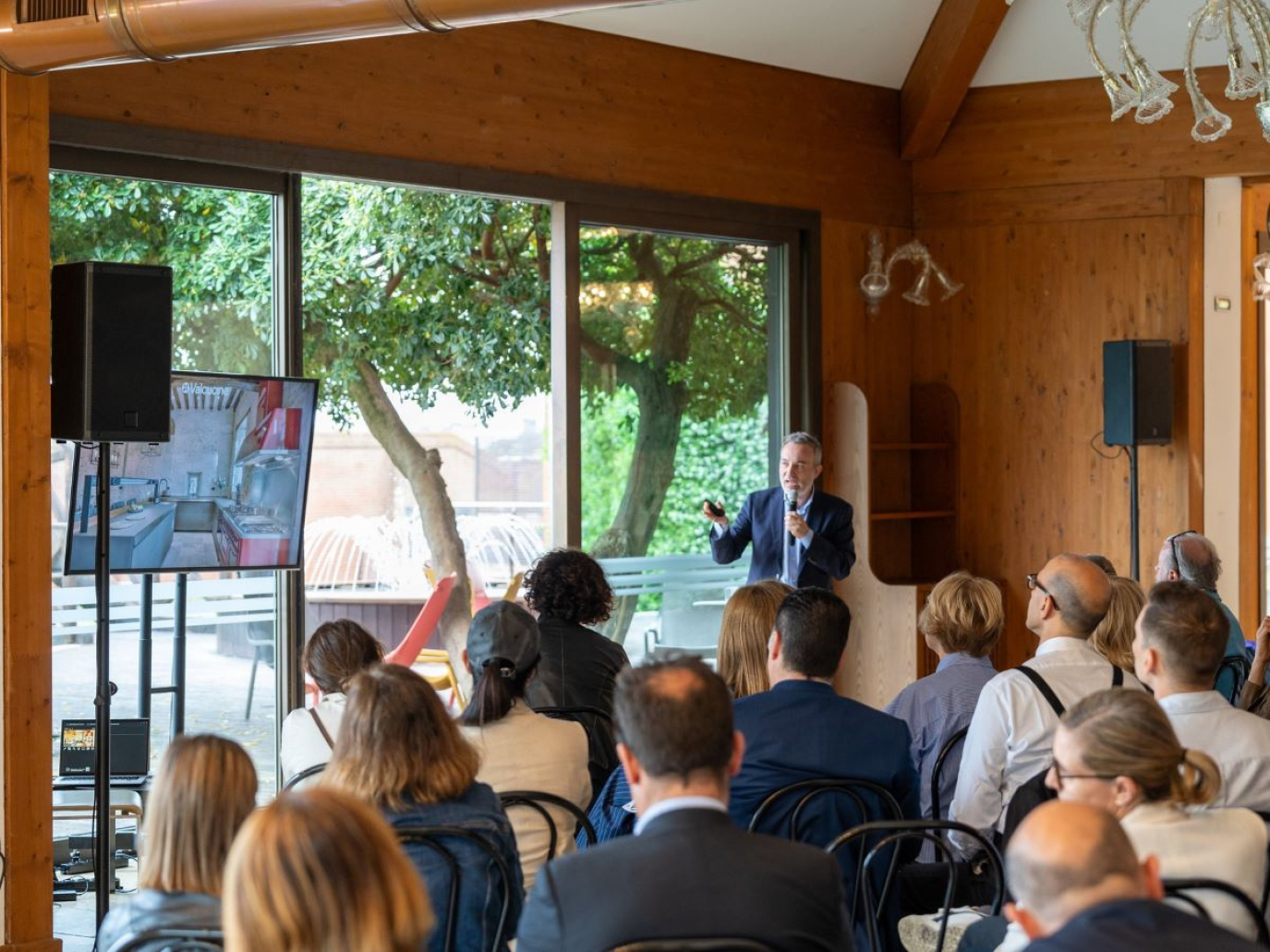
The Italian wood-furniture supply chain, predominantly consisting of small and medium-sized enterprises with a long tradition, stands out worldwide for its circularity rate . 96% of companies use sustainable materials, 70% invest in energy efficiency, 76% select suppliers according to environmental criteria and over 60% have at least one system certification, according to estimates by FederlegnoArredo. The federation has been bringing together the wood, cork, furniture, lighting and furnishing industries since 1945.
A business community undergoing profound change, facing a number of new regulations, but also moving independently towards sustainability, ahead of its time and legislation. This will be discussed at Ecomondo, the leading international event in the green and circular economy sectors, scheduled to take place from 4 to 7 November 2025 at the Rimini Exhibition Centre.
FederlegnoArredo will participate for the third consecutive year as an exhibitor with its own stand in HALL SUD/107 and within the conference programme, with specialised events dedicated to targeted groups.
The new PPWR regulation
On 11 February 2025, the EU Packaging & Packaging Waste Regulation (PPWR) came into force, which seeks to standardise the rules for all packaging placed on the European market, promoting reuse and recycling. The goal is to reduce the amount of this type of waste per capita by 5% by 2030, 10% by 2035 and 15% by 2040, compared to 2018 levels.
The possible impacts on the supply chain will be highlighted during the event The contribution of wood and cork packaging to the circular economy in light of the new PPWR regulation, organised for Wednesday 5 November by AssoImballaggi of FederlegnoArredo at the Sala Tulipano Hall B6 of RiminiFiera, from 10:30 to 12:30.
As well as discussing recyclability, reuse and compostability, the results of the LCA (Life Cycle Assessment) study on custom-designed wooden pallets, promoted by AssoImballaggi in collaboration with the University of Florence, will be unveiled: the research measured the environmental impact of products at every stage of their life cycle, as previously done for Epal pallets, industrial packaging and folding crates. In this case, the study highlights the environmental value of custom-designed pallets, accounting for the majority of wooden packaging in Italy.
Extended Producer Responsibility
Another important topic is extended producer responsibility (EPR). While EPR systems are being developed across Europe in a growing number of sectors, as required by law, and new eco-design strategies are being drawn up, Italian wood and furniture manufacturers are voluntarily preparing to face this transformation. This will be discussed on Thursday 6 November during the event Furniture and furnishing products from an EPR perspective. The new scenarios and the Italian project, organised by FederlegnoArredo and the National Furniture System Consortium, in collaboration with the Ecomondo & ReteAmbiente technical and scientific committee, at Sala Ravezzi 2 Hall Sud at RiminiFiera, from 2:15 pm to 4:00 pm.
An overview of current innovations and measures, through assessments and testimonials from the relevant institutions and key players in the new system. These include the CNSA, led by its president Claudio Feltrin, which in 2025 signed a programme agreement with the Ministry of the Environment and Energy Security (MASE). This launched a trial of different furniture collection and recycling systems in four sample cities, aimed at gathering data, opinions and best practices to improve the management of end-of-life furniture, reducing the economic and environmental loss that currently occurs when these high-quality products become waste.
The Deforestation Regulation (EUDR)
On Friday, 7 November, the topic of Ecological transition, forests and agro-industrial supply chains: the implementation of the deforestation regulation (EUDR) will be tackled, hosted by the Ecomondo & Confagricoltura Technical Scientific Committee, in collaboration with Fondazione AlberItalia and Cluster Italia Foresta Legno during the panel discussion at the Agorà Augusto – Bioeconomy Area Hall D1 of RiminiFiera, from 10:00 to 11:00.
During this event, as part of the round table discussion entitled How to meet the new requirements? Comparing supply chains, Claudio Feltrin, president of FederlegnoArredo, will share the sector's experience and concerns regarding Regulation (EU) 2023/ 1115 on deforestation and forest degradation (EUDR) and Regulation (EU) 2024/3234, which delayed its entry into force until 30 December 2025 for large and medium-sized enterprises and until 30 June 2026 for micro and small enterprises.
It is precisely on this last point, as well as on the need to simplify procedures, that the European Commission has recently proposed a number of changes, which must now be discussed by Parliament and the Council: in summary, additional time is envisaged, but only for SMEs (until 30 December 2026), and lighter compliance requirements downstream in the supply chain. Specifically, the new legislation aims to reduce the effects of so-called “embedded deforestation”, namely the one caused mainly by the import of primary goods such as soy, palm oil, beef, cocoa, coffee and wood, in order to safeguard the ecological value of forest ecosystems in the countries producing these raw materials (predominantly in the tropical area).
Ecomondo will create a space for dialogue in which to network information and share the most critical aspects relating to the implementation of the new procedure. This is in order to ensure the right balance between the need for environmental protection and climate mitigation, which FederlegnoArredo supports, and the supply needs of strategic supply chains for Made in Italy.
EcoRefibre and other EU projects
Finally, Ecomondo will offer an opportunity to discuss circular economy issues from all angles, sharing practices, needs and points of view from different sectors. To this end, on Tuesday 4 November, ISWA will hold a workshop entitled Driving the circular transition on the EU: Recovering Value from Secondary Raw Materials, in the Sala Camelia on the 1st floor of Hall B6, from 10 am to 1 pm.
Four EU-funded projects (Wood2Wood, EcoRefibre, CIRCULess and ReBoat) are teaming up to share cross-sector knowledge and present innovative technical and digital solutions that transform different waste streams – including wood waste from construction, demolition and manufacturing, as well as plastic and textile waste – into high-value products.
The event will culminate in a round table discussion, followed by an interactive Q&A session with the experts present, including Omar Degoli, head of the Environment and Circular Economy Office at FederlegnoArredo, who will share the experience of EcoRefibre.
Focus on Mediterranean countries
FederlegnoArredo will discuss this European project, which aims to identify a circular economy approach to recycling wood waste by transforming it into fibreboard and new building products, again on Tuesday 4 November, during the event Technological solutions for resources recovery from end-of-life products and materials in the Mediterranean landscape (in the Sala Tiglio in Hall A6, from 9:30 am to 5:30 pm), held by the Technical Scientific Committee of Ecomondo & Italian Chemical Society - CABC Division, ISWA International, ATIA - ISWA.
The event, specifically, is scheduled for 3:00 p.m. (From fibre to fibre: Predicting future waste fibreboard volumes across Europe, and emerging solutions for wood fibre reuse), when FederlegnoArredo is scheduled to participate, together with several universities and research institutes. Best practices among countries in the Mediterranean area will be shared in order to explore how new technologies can increase resource circularity and environmental benefits in various economic sectors, driving industrial growth in a more sustainable way.
Cover: photo by FederlegnoArredo via Flickr



